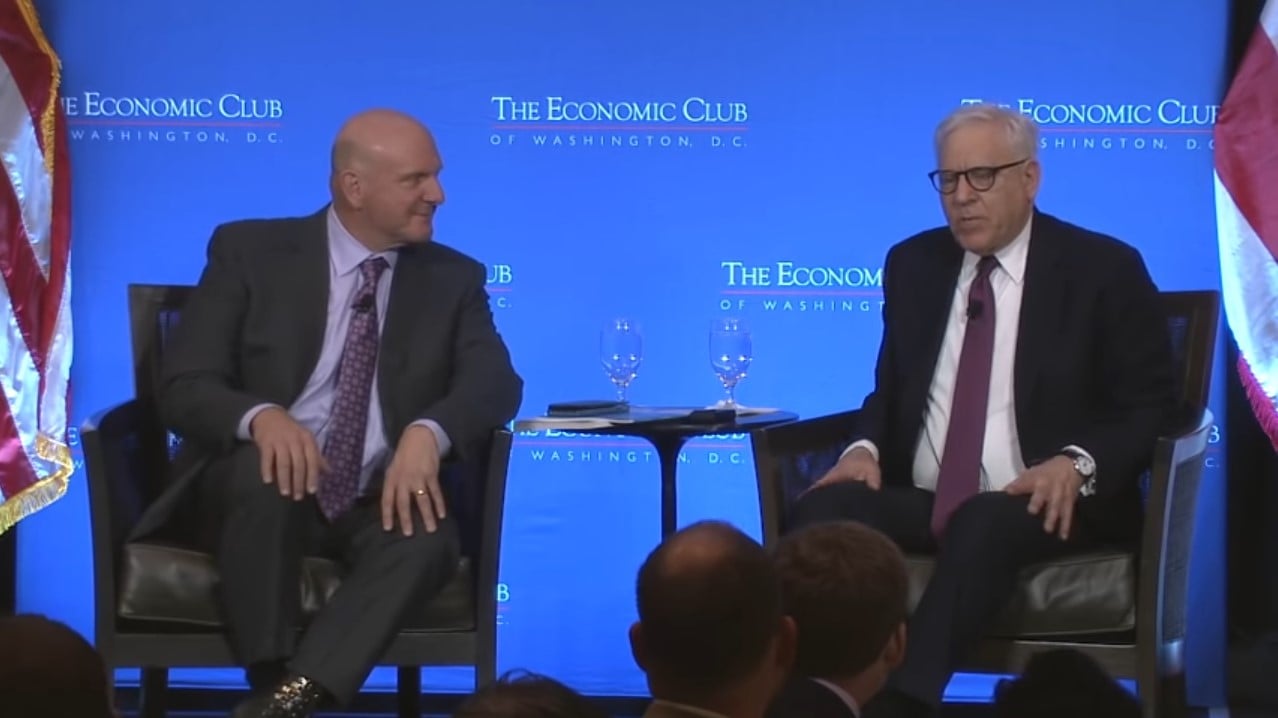Steve Ballmer, Founder, USAFacts and Former CEO, Microsoft, speaks with Economic Club president David M. Rubenstein on Tuesday April 30, 2019.
Steve Ballmer Talks About The Price Of Sports Teams And Philanthropy
Transcript
So why don’t we just start with a basketball question which is this. With seven minutes and 31 seconds to go. In the third quarter of the second game of the playoffs your team was down by 31 points. They came back. And. It was an NBA record for a comeback in a playoff. Did you send in the plays that enable that to happen.
Oh yeah. I said let’s pick with Torres and roll with Lou. No I said absolutely nothing absolutely nothing for the biggest comeback by the way in NBA playoff history. In case everybody was wondering about that. It was unbelievable I was sitting with my son and they said Oh God I just I don’t want this to embarrass ourselves. We’ve got to play hard.
And sure enough our guys tough hard playing resilient gritty kind of like Microsoft.
All right. So did you go in the locker room afterwards and say. Congratulations and win one for Steve. Or something like that.
No I went in the locker room and gave a bunch of sweaty guys a little dab as they say. And you know it’s in sports the guys win these games for themselves and maybe for the fans and the city. I just mostly thank the guys and talked about the great pride they had.
So you bought a basketball team for a record amount of the time two billion dollars. So did that please all the other owners that their teams were now worth more and they thank you for increasing the value of their teams does that happen a lot you know.
Not really although it was quite it uplift in the price of sports teams would people unless people are going to sell something. I’m not sure they care what the asset value is. At the same time they were a little afraid I’d throw money around a little aggressively to enhance the quality of our team. So I think they had a little bit of eyes on so to speak but you enjoy owning the team. I love owning a team. I love it. I love it. It’s not quite as exciting as you’re at least in my case is my kids basketball.
But it’s it’s right up there and any more sports teams in your horizon. My wife says no. OK. So that probably means not going to happen anytime soon. Correct.
OK. So let’s talk about USA facts for a moment. So what you decided to do was to let people know more about the U.S. government and also the facts of our country is that the idea and where did you come up with the idea for that.
Yeah I I. When I retired my wife was trying to pull me aggressively in our philanthropy which focuses in on kids who were born with not much of a shot so to speak at the American dream. And I argued the government spends the money for that. And she kind of said do dude we can do a little better than that. But I made it kind of my mission to try to understand that where money comes from doesn’t go into this area. And it was very hard and I have kind of a systems view and it was very hard to map out not just at the federal level but the states the state spend a good part of the money that actually helps kids. How does this all come together. What impact does it make. I looked for the equivalent of a corporate ten K because when I was working and I wanted to understand an Amazon or whatever you grab that report and study. There wasn’t such a thing I thought governments should be able. And when I say government I mean state federal local and so we pulled it together we created a 10k and we created an annual report.
All right.
So when you say we who helped you do this small small team merry little band at the time there were three of us plus a consultant at Lynchburg College who knew every government database there was because we use about one hundred and ten different government data. We only use government numbers. That’s how businesses work. I think government should believe in its numbers use its numbers. That’s a longer story. How how that doesn’t really happen and then we had a team at the University of Pennsylvania Wharton School it was working consistent with another project they were doing.
Now you were a numbers person you were a math applied math and economics person but there is a Putnam math contest that is given out every year and you actually scored higher than Bill Gates was that right.
In both of our best years which was software you’re in college. Yeah I did. I was fifty seventh in the nation and Bill was I think 97 something.
Did you ever mention that to him. Not not of late. No. OK.
So let’s talk about the fact that you were at most surprised about when you came through with this the USA faction you out also the third year.
Yeah it’s the third year. We were just.





